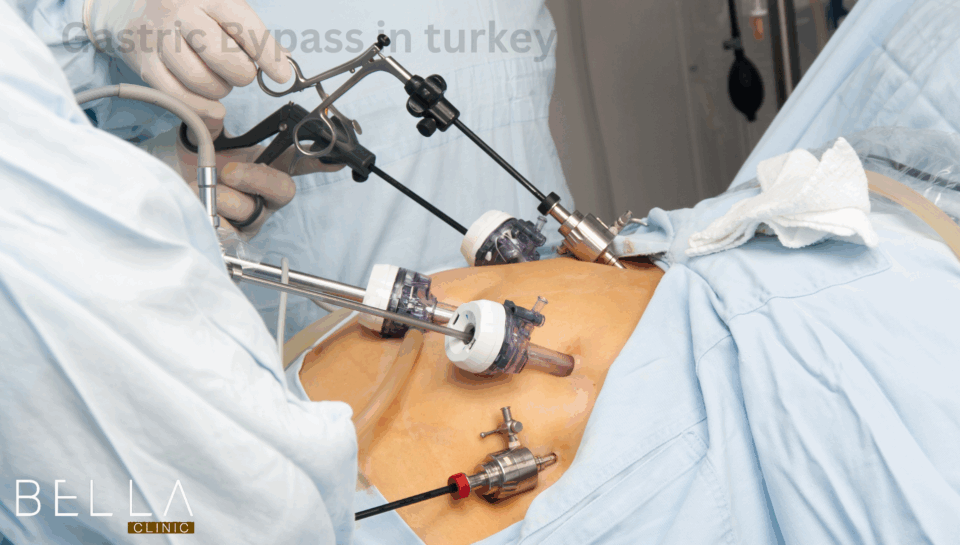A Gastric Bypass in Turkey is a surgical weight-loss procedure that alters the digestive system. It works by creating a small stomach pouch and bypassing a portion of the small intestine.
The procedure is a globally recognized and highly effective treatment for severe obesity. Turkey has become a leading destination due to its experienced surgeons and advanced bariatric centers.
Its benefits are profound, including significant long-term weight loss and the resolution of many comorbidities. It is considered a gold standard in the metabolic and bariatric surgery field.
Why is Gastric Bypass Performed?
Gastric Bypass is performed primarily for medical reasons to treat morbid obesity and its related health conditions. It is particularly effective at improving or resolving type 2 diabetes, hypertension, and sleep apnea.
The surgery is designed to facilitate substantial and durable weight loss that has not been achievable through diet and exercise alone. A Gastric Bypass in Turkey offers patients a powerful tool to regain their health and improve their quality of life.
Common candidates are patients with a Body Mass Index (BMI) of 40 or higher. It is also indicated for individuals with a BMI of 35-39.9 who suffer from serious obesity-related health problems.
Why Choose Gastric Bypass in Turkey?
Turkish bariatric surgeons are renowned for their high volume of experience and expertise in laparoscopic techniques. They operate within JCI-accredited hospitals that adhere to the highest international safety and quality standards.
Clinics in Turkey are equipped with the latest surgical technology and use premium-quality equipment. This commitment to modern medicine ensures that procedures are both safe and highly effective.
The affordability of comprehensive bariatric surgery packages offers exceptional value. The high quality of care and life-changing results make a Gastric Bypass in Turkey a top choice for patients from around the world.
Ideal Candidates for the Procedure
To be considered a suitable candidate for this life-changing weight-loss surgery, a person must undergo a thorough evaluation by a multidisciplinary team.
Who is a Good Candidate?
- Individuals with a BMI of 40 or greater, or a BMI of 35 or greater with significant obesity-related comorbidities.
- People who have a history of failed weight loss attempts through diet and exercise.
- Those who are fully informed and committed to lifelong dietary changes and medical follow-up.
Who Should Avoid the Procedure?
- Patients with untreated, severe psychiatric disorders or active eating disorders.
- Individuals with current drug or alcohol dependency.
- People with certain medical conditions that make them unable to tolerate major surgery.
Preparation Before a Gastric Bypass in Turke
Before surgery, you will have a comprehensive medical assessment, including blood tests, an endoscopy, and consultations. This is to ensure you are fully prepared and optimized for a safe procedure.
You will be required to follow a special pre-operative diet, typically a low-calorie liquid diet, for several weeks. This crucial step helps to shrink the liver, making the laparoscopic surgery safer and technically easier.
Quitting smoking at least a month before surgery is mandatory to reduce the risk of complications. Your surgical team will also provide instructions on adjusting or stopping certain medications.
How is a Gastric Bypass Performed?
The surgery is performed under general anesthesia and is almost always done laparoscopically (keyhole surgery). The procedure itself takes about 2 to 3 hours, with a typical hospital stay of 2 to 3 nights for monitoring.
- Create Pouch: The surgeon uses a surgical stapler to create a very small pouch at the top of the stomach, about the size of an egg. This restricts the amount of food that can be consumed.
- Divide Intestine: The small intestine is divided a short distance from the stomach.
- Reroute and Connect: The lower part of the divided intestine is brought up and connected directly to the new, small stomach pouch.
- Reattach Intestine: The upper part of the small intestine (which carries digestive juices) is reconnected to the lower part further down. This “bypasses” the main part of the stomach and the first section of the small intestine, reducing calorie absorption.
Post-Procedure Period and Adaptation
After the surgery, you will start on a strict, multi-phase diet beginning with clear liquids. This allows your new stomach pouch and connections to heal properly without being stretched.
Adapting to the new feelings of fullness from the small pouch is a key part of the journey. The recovery from a Gastric Bypass in Turkey requires patience and a commitment to learning new eating habits.
The initial recovery period lasts several weeks, focusing on the gradual progression of your diet. Following your surgical team’s guidelines precisely is absolutely critical for your safety and success.
Post-Procedure Care and Instructions
- Adhere strictly to the phased dietary plan, progressing from liquids to pureed, soft, and then solid foods as directed.
- Take lifelong vitamin and mineral supplements as prescribed. This is mandatory to prevent serious nutritional deficiencies.
- Attend all scheduled follow-up appointments with your bariatric team for monitoring and support.
- Engage in regular physical activity once cleared by your surgeon to maximize health benefits and weight loss.
- Commit to the new lifestyle rules to ensure the long-term success of your Gastric Bypass in Turkey.
Risks and Possible Considerations
While the procedure is safe with an experienced surgeon, rare short-term complications can include leaks, bleeding, or infection. Long-term risks include hernias, ulcers, and nutritional deficiencies.
Prevention is best achieved by choosing a high-volume, accredited bariatric center. The patient’s strict adherence to diet, supplement protocols, and follow-up care is equally important.
Bella Clinic connects you with leading bariatric centers that offer extensive aftercare programs. Our team provides continuous support to facilitate a safe and successful weight-loss journey.
Are the Results Permanent?
Most patients lose 60-80% of their excess body weight, with the most rapid loss occurring in the first 12-18 months. The final result is a significantly lower, healthier, and more stable body weight.
The surgical alteration to your digestive system is considered permanent. While reversal is technically possible in rare circumstances, it is a highly complex and risky procedure that is seldom performed.
The results of the surgery can last a lifetime, but this is entirely dependent on the patient’s commitment. The success of your Gastric Bypass in Turkey relies on your lifelong adherence to the necessary diet and lifestyle changes.
Cost of a Gastric Bypass in Turkey
Determining the exact cost of gastric bypass surgery in Turkey requires a personalized quote, as prices vary based on several key factors. The final cost is influenced by the surgeon’s experience, the hospital’s reputation, and the comprehensiveness of the all-inclusive package.
These packages often cover not just the surgery itself, but also the hospital stay, hotel accommodation, VIP transfers, and post-operative support.
While it’s difficult to provide a single figure, the cost for a gastric bypass in Turkey can generally range approximately from €4,000 to €7,000, depending on the level of services included, making it significantly more affordable than in the UK or the US.
Comparing Turkey with Other Countries
- Price: Based on 2025 data, gastric bypass in Turkey can be up to 70% more affordable than in other developed nations, making this life-saving surgery accessible.
- Quality: Turkish hospitals are JCI-accredited and equipped with the latest laparoscopic technology, ensuring patient care and safety meet the highest global standards.
- Surgeon Expertise: Bariatric surgeons in Turkey are high-volume specialists with immense experience. This expertise is a primary reason patients choose Gastric Bypass in Turkey.
- Comprehensive Care: The patient journey is managed seamlessly with all-inclusive packages that cover everything from airport pickup to dietetic support, ensuring a stress-free experience.
Frequently Asked Questions
What is dumping syndrome? It occurs when sugary or fatty foods move too quickly to the intestine, causing nausea and cramps. It’s managed by avoiding trigger foods.
How much weight will I lose? Most patients lose 60-80% of their excess body weight over 12-18 months.
Is Gastric Bypass in Turkey safe? Yes, when performed by an experienced bariatric surgeon in an accredited hospital, it has a very high safety profile.
Will I have to diet for the rest of my life? You will need to follow a specific healthy eating plan for life to get proper nutrition and maintain your weight loss.
Can I get pregnant after a Gastric Bypass in Turkey? Yes, but it’s recommended to wait at least 18 months after surgery before attempting conception.
How long until I can return to work? Most patients return to office-based work within 2-4 weeks, depending on their individual recovery.
Is a Gastric Bypass in Turkey reversible? While technically possible, reversal is a very complex, high-risk procedure and is rarely done.
Why Choose Bella Clinic?
Our Services
Bella Clinic is your dedicated partner in your weight-loss journey, connecting you with Turkey’s elite bariatric surgeons and comprehensive support teams.
- Complete VIP transfer services for the airport, hotel, and all clinic appointments
- A personal host and translator to assist you throughout your entire stay
- A complimentary, detailed consultation with a top bariatric surgeon and team
- Connection to accredited bariatric centers offering comprehensive aftercare
- Organization of your stay in comfortable, premium partner hotels
Client Testimonials
Summary and Patient Experience
Gastric bypass surgery is a powerful, life-changing tool that offers a permanent solution for morbid obesity, leading to dramatic weight loss and a healthier, more active life.
Take the first step towards a healthier future. Contact Bella Clinic today for your free, no-obligation consultation and learn if gastric bypass surgery is the right choice for you.
 English
English 





